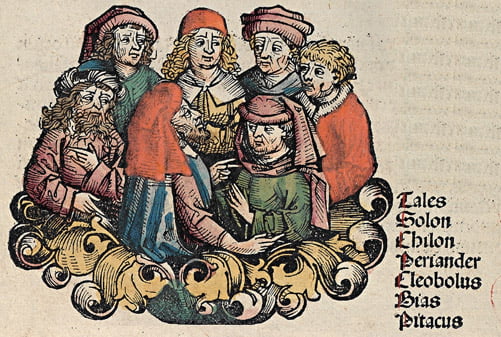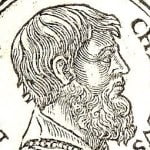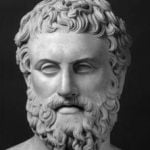The Seven Sages of Ancient Greece was the title given to seven wise men who were philosophers, statesmen and law-givers in Ancient Greece.
The Seven Sages of Ancient Greece are known for their practical wisdom, which was very useful and original at the time. The names of these wise men were put up on the wall of the temple at Delphi, as dedications to the god Apollo.
Plato provides the earliest list of the so-called Seven Sages, although Simonides, a century earlier, sets out to answer Pittacus and Cleobulus as though striving for a place on the list.
There is a controversy on who these 7 sages of Ancient Greece were; their names are known to most of us due to their genius, however, the historians disagree on a couple of names – whether they made it to the list or not.
According to the most acceptable opinions, the Latin and Greek names of the 7 sages of Ancient Greece are:

Names of the 7 Sages of Ancient Greece
 Solon of Athens – (Σόλων), Athenian statesman, the son of Execestides of the family of Codrus, was born about 638 B.C. The prodigality of his father made it necessary for Solon to maintain himself by trade, especially abroad.
Solon of Athens – (Σόλων), Athenian statesman, the son of Execestides of the family of Codrus, was born about 638 B.C. The prodigality of his father made it necessary for Solon to maintain himself by trade, especially abroad.
In his youth Solon became well known as the author of amatory poems and later of patriotic and didactic verse. Hence his inclusion among the Seven Sages.
The reforms of Solon may be divided under three heads – economic, constitutional and miscellaneous. They were necessary owing mainly to the tyrannical attitude of the rich to the poorer classes. Of these many had become slaves in lieu of payment of rent and loans, and thus the land had fallen gradually into the hands of the capitalists. It was necessary to readjust the economic balance and to provide against the evil of aristocratic and capitalist predominance.
Some of his main ideas that urged the Ancient Greeks to include Solon to the list of Seven Sages are: Creating a supreme court. Repealing the laws of Dracon, which punished even small offenses with death, making only murder and manslaughter punishable by death. Allowed the poor to participate in government. The founding of the Western tradition of constitutional government in the laying of the foundation for classical Greek culture.
Quotes by Solon:
– “Nothing in excess”
– “No man is happy. He is, at best, fortunate.”
– “Put more trust in nobility of character than in an oath”
– “Laws are like spiders’ webs which, if anything small falls into them they ensnare it, but large things break through and escape”
“Society is well governed when the people obey the magistrates, and the magistrates obey the law”
 Chilon of Sparta – (Χείλων) son of Damagetus, one of the Seven Sages of Greece, flourished about the beginning of the 6th century B.C. In 560 (or S56) Chilon acted as ephor, an office which he is even said to have founded.
Chilon of Sparta – (Χείλων) son of Damagetus, one of the Seven Sages of Greece, flourished about the beginning of the 6th century B.C. In 560 (or S56) Chilon acted as ephor, an office which he is even said to have founded.
The tradition was that he died of joy on hearing that his son had gained a prize at the Olympic games. According to Chilon, the great virtue of man was prudence, or well-grounded judgment as to future events.
Quotes by Chilon of Sparta
– “Know thyself”.
– Prefer a loss to a dishonest gain; for the one is painful but once, but the other for one’s whole life.
– Consider the end.
– Mutually giving and receiving aid, They set each other off, like light and shade.
– Whom drink made wits, though nature made them fools.
 Thales of Miletus – (Θαλής). Thales, the Greek physical philosopher, son of Examyus and Cleobuline, is universally recognized as the founder of Greek geometry, astronomy and philosophy. Why he was includes in the 7 sages? He was the first man in history to correctly predict a solar-eclipse, the first man in history to have specific mathematical discoveries attributed to him. He determined the height of an Egyptian pyramid by measuring the length of its shadow and divided the year into 365 days.
Thales of Miletus – (Θαλής). Thales, the Greek physical philosopher, son of Examyus and Cleobuline, is universally recognized as the founder of Greek geometry, astronomy and philosophy. Why he was includes in the 7 sages? He was the first man in history to correctly predict a solar-eclipse, the first man in history to have specific mathematical discoveries attributed to him. He determined the height of an Egyptian pyramid by measuring the length of its shadow and divided the year into 365 days.
It is probable, however, that in the case of Thales, the appellation ” wise man,” which was given to him and to the other six in the archonship of Damasius (586 B.C.), was conferred on him not only on account of his political sagacity, but also for his scientific eminence (Plut. Solon, c. 3). To about the same time must be referred his celebrated prediction of the eclipse of the sun, which took place on the 28th of May 585 B.C.
Quotes by Thales
– “To bring surety brings ruin”.
– “Nothing is more active than thought, for it travels over the universe, and nothing is stronger than necessity for all must submit to it.”
– “Hope is the only good that is common to all men; those who have nothing else possess hope still”
– “A multitude of words is no proof of a prudent mind.
– “The past is certain, the future obscure.”
 Bias of Priene – (Vias – Βίας)– a preeminent lawyer and judge of his time, he is included in the list of the 7 sages due to his influence to the legal system of the time, although we do not have enough information on his personality.
Bias of Priene – (Vias – Βίας)– a preeminent lawyer and judge of his time, he is included in the list of the 7 sages due to his influence to the legal system of the time, although we do not have enough information on his personality.
He wisely said that as a judge, he would rather decide a dispute between two of his enemies than between two of his friends. No matter what he ruled in the first case, one of the two enemies would become his friend, but in the second case, one of his two friends would become an enemy.
Bias Quotes:
– “Too many workers spoil the work”.
– “It is better to decide a difference between enemies than friends, for one of our friends will certainly become an enemy and one of our enemies a friend”
– ” Be slow in considering, but resolute in action.”
– “Monarch, thou wishest to cover thyself with glory; be the first to submit to the laws of thy empire.”
– “Some, by admiring other men’s virtues, become enemies to their own vices.”
 Cleobulus of Lindos – (Kleovoulos – Κλεόβουλος) a tyrant in the city of Lindus in the Greek island of Rhodes. Celobulus was distinguished for his strength and his handsome person, for the wisdom of his sayings, the acuteness of his riddles and the beauty of his lyric poetry.
Cleobulus of Lindos – (Kleovoulos – Κλεόβουλος) a tyrant in the city of Lindus in the Greek island of Rhodes. Celobulus was distinguished for his strength and his handsome person, for the wisdom of his sayings, the acuteness of his riddles and the beauty of his lyric poetry.
Cleobulus is said to have held advanced views as to female education, and he was the father of the wise Cleobuline, whose riddles were not less famous than his own. His offer to the world are the hexameter verse, and the in depth analysis of the Egyptian philosophy.
Cleobulus Quotes:
– “Moderation is the chief good”.
– Ignorance and talkativeness bear the chief sway among men
– “Seek virtue and eschew vice.”
– “Be ready for reconciliation after quarrels.”
– “Do not be fickle, or ungrateful.”
 Pittacus of Lesvos – (Pittakos – Πιτακκός). About 611 BC, Pittacus overthrew Melanchrus, tyrant of Lesvos, with the assistance of the brothers of the poet Alcaeus.
Pittacus of Lesvos – (Pittakos – Πιτακκός). About 611 BC, Pittacus overthrew Melanchrus, tyrant of Lesvos, with the assistance of the brothers of the poet Alcaeus.
In a war (606 BC) between the Mytilenaeans (the people of the Greek island of Mytilene or Lesvos) and Athenians for the possession of Sigeum on the Hellespont, Pittacus slew the Athenian commander Phrynon in a single combat.
In 589 BC his fellow citizens entrusted Pittacus with despotic power (with the title of Aesymnetes) for the purpose of protecting them against the exiled nobles, at the head of whom were Alcaeus and his brother Antimenides. He resigned the government after holding it for ten years, and died ten years later.
According to Diogenes Laertius, who credits him with an undoubtedly spurious letter to Croesus (with whom his connexion was probably legendary), Pittacus was a writer of elegiac poems, from which he quotes five lines.
Pittacus Quotes:
– “It is hard to be good”
– “Know when to act”
– “That state is best ordered when the wicked have no command, and the good have.”
– “Do not say beforehand what you are going to do; for if you fail, you will be laughed at.”
– “Cultivate truth, good faith, experience, cleverness, sociability, and industry.”
 Periander of Corinth – (Periandros – Περίανδρος). Periander appears as a patron of literature, for it was by his invitation that the poet Anion came to Corinth to organize the dithyramb.
Periander of Corinth – (Periandros – Περίανδρος). Periander appears as a patron of literature, for it was by his invitation that the poet Anion came to Corinth to organize the dithyramb.
He devoted no less attention to the increase of Corinthian commerce, which in his days plied busily on both eastern and western seas. Periander established colonies at Potidaea and Apollonia in Macedonia, at Anactorium and Lefkas in north-western Greece, and he is said to have projected a canal through the Isthmus.
In Greece proper he conquered Epidaurus (Epidavros) and with the help of his fleet of triremes brought the important trading centre of Corcyra (Corfu) under his control, while his interest in the Olympian festival is perhaps attested by a dedication which may be ascribed to him – the famous “chest of Cypselus.”
Periander cultivated friendly relations with the tyrants of Miletus and Mytilene, and maintained a connexion with the kings of Lydia, of Egypt and, possibly, of Phrygia. The main reason why he was included in the list of the 7 sages was the fact that he constructed the famed Diolcos, which carried ships over the canal of Corinth for a thousand years, in order to destroy his naval opponents.
Periander Quotes:
– “Forethought in all things”.
– “Be moderate in prosperity, prudent in adversity”
– “Practice is everything. This is often misquoted as Practice makes perfect.”
– “Nothing is impossible to industry.”
– “Your knowing a thing is nothing, unless another knows you know it.”
